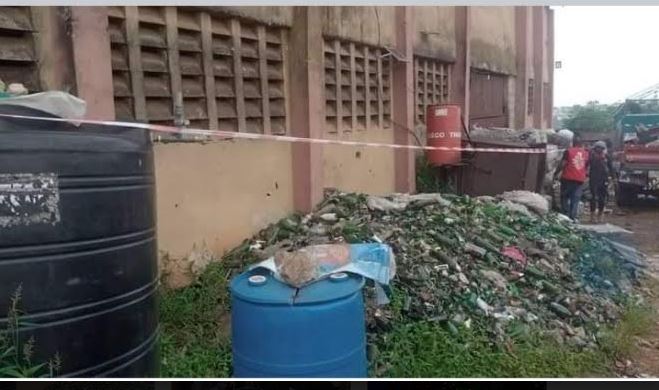Officers from the Presidential Task Force Against Economic Sabotage and Oil Vandalism, in collaboration with the Operation Clean and Healthy Anambra Brigade, executed a significant raid on an illegal wine manufacturing plant located in Onitsha. This operation, which took place in the Nkpor area of Anambra State, was aimed at dismantling a facility notorious for producing counterfeit versions of esteemed alcoholic brands. The establishment had purportedly been in operation for several years, generating and distributing a wide array of unauthorized wines that infiltrated local markets, thus endangering public health and safety. The raid resulted in the immediate closure of the facility, which was found to be mass-producing imitation wines and beverages without proper regulatory approval.
During the operation, law enforcement officers confiscated numerous fake products linked to well-known brands, including Classic Heaven, Baron Devanis, Dutch Black, Triple MW, and Hennessy. The raid also led to the arrest of seven individuals present at the site. These individuals are believed to be integral to the operation of the facility, which was situated along Onowu Street, near the bustling Enugu-Onitsha Expressway. The actions taken by the task force illustrate the seriousness of the issue at hand, emphasizing the growing trend of illegal production of counterfeit goods within the state and the broader implications it has for both consumer safety and economic integrity.
Celestine Anere, the Managing Director of the OCHA Brigade, revealed that the raid was initiated based on credible intelligence gathered by enforcement officers. Upon entering the premises, task force members discovered that various sections of the facility had been repurposed into makeshift factories. These areas were busy with the production and packaging of multiple alcoholic beverages intended for the open market. The officers reported seizing over 2,000 cartons filled with these counterfeit creations, in addition to unsafe equipment used for their manufacturing, including mixing tanks, makeshift filtration systems, and heaps of empty bottles meant for reuse in deceptive packaging.
In light of these discoveries, Anere urged the public to exercise caution and vigilance when purchasing alcoholic beverages, especially in a marketplace rife with deceitful practices. He emphasized the importance of registered and certified products, advising consumers to remain alert to potential dangers associated with unregulated alcoholic drinks. He also encouraged community members to report any suspicious activities to the authorities by providing multiple hotlines for inquiries and complaints, further illustrating the task force’s commitment to protecting consumer rights and public health.
Collins Enebeli, who serves as the State Coordinator for the Presidential Task Force Against Economic Sabotage and Oil Vandalism, asserted that the task force remains dedicated to eradicating all incidents of economic sabotage within Nigeria. He characterized Anambra State as a prominent hub for the production of counterfeit items, underscoring the challenges faced in combating this illicit activity. The enforcement of strict actions and increased vigilance is essential in maintaining the integrity of the local economy and protecting consumers from harmful products that could jeopardize their health.
In the aftermath of the raid, some of the detained suspects were interviewed and claimed ignorance regarding the factory’s lack of certification, insisting they were merely seeking employment to support their families. They implored the government for mercy, revealing that the factory’s operator, a man identified only as Ikechukwu, was responsible for supplying significant quantities—over 1,000 cartons—of these illicit products on a daily basis. Their testimonies reflect the complex social dynamics at play, wherein individuals are often caught in precarious economic situations, compelling them to engage in illegal activities amid a backdrop of insufficient legitimate employment opportunities. This scenario underscores the need for a multifaceted approach to address both the supply and demand for counterfeit goods, while simultaneously providing support for those affected by broader economic challenges.














